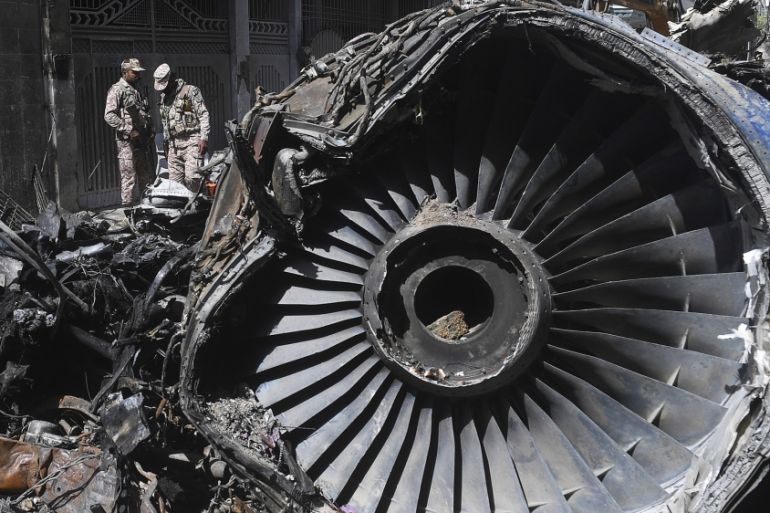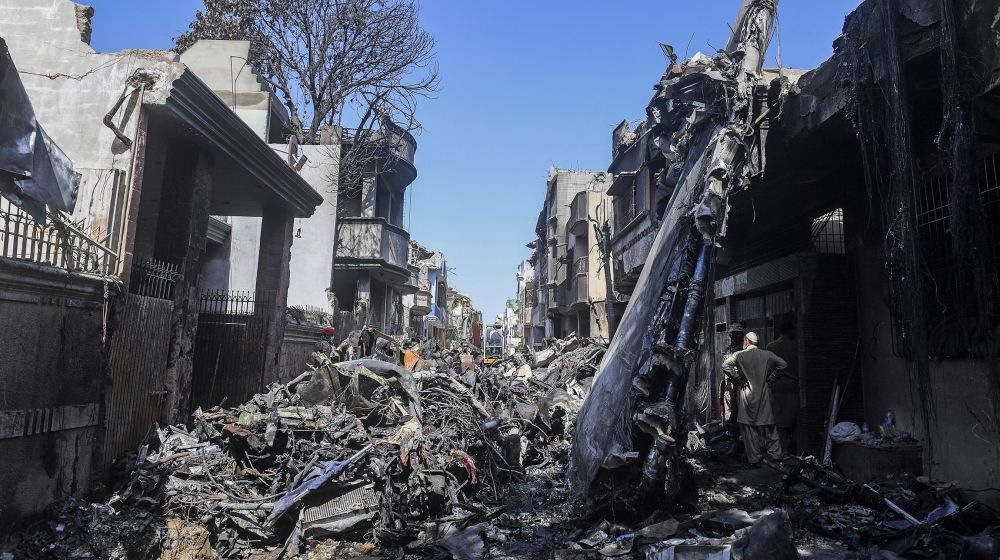Pakistan investigates PIA plane crash that killed 97 in Karachi
Investigators remove wreckage from site of Friday’s crash as pilots’ union objects to lack of representation in probe.

Islamabad, Pakistan – Air crash investigation teams have begun to remove wreckage from the site of a commercial airliner crash in the southern Pakistani city of Karachi that killed 97 people last week.
Officials on Wednesday said the search for the plane’s cockpit voice recorder is still on, while a major pilots’ union in the country has objected to a lack of representation on the crash inquiry board.
Keep reading
list of 3 itemsBlack box recovered from Karachi plane crash site
Qatar Airways to cut ‘substantial’ number of jobs over pandemic
On Wednesday, investigators began the process of removing wreckage and debris from the narrow, congested lanes of Karachi’s Model Colony area and reconstructing elements of the crash site at a disused hangar at the Jinnah International Airport, about a kilometre (0.6 mile) away.
“The Aircraft Accident Investigation Board has taken over the crash site and the investigation,” said Abdullah Khan, spokesman for Pakistan International Airlines (PIA), the carrier that operated flight PK-8303.
“They are collecting evidence and are making maps and charts to calculate trajectories [leading up to the crash].”
Flight PK-8303 from the eastern city of Lahore crashed into the Model Colony neighbourhood on approach to Karachi’s main international airport on Friday, killing 97 of the 99 people on board.
The two survivors continue to be treated for their wounds, while four others were injured on the ground when the plane slammed into a residential area.
Khan said investigators have found the plane’s digital flight data recorder, but were continuing to search for the cockpit voice recorder, which would provide vital insight into what occurred within the cockpit in the final minutes of the flight.
“They have expanded the circle of the search, because it could be that because the aircraft landed tail first, the [cockpit voice recorder] could have been tossed far away,” he said.
On Tuesday, an 11-member team from commercial aircraft manufacturer Airbus, which makes the A320 jet, arrived in Pakistan to assist in the investigation.
Initial reports indicate the flight made an aborted effort to land before attempting a go-around, during which its engines failed.
The aircraft was unable to make it back to the airport and crashed roughly a kilometre short of the runway.
|
|
Pilots’ union objects
Hours after the crash, Pakistan’s government formed a four-member investigation team to probe the crash, which included three members of the country’s air force.
The Pakistan Airline Pilots Association (PALPA), the country’s largest pilots’ union, however, objected to the constitution of the board without a commercial pilot represented.
“We feel that there are other companies who are more qualified for this, like the [US government’s] National Transportation Safety Board, the International Federation of Airline Pilots Associations (IFALPA) and the International Civil Aviation Organisation (ICAO),” said Qasim Qadir, PALPA spokesperson and a serving pilot with PIA.
“They want to set aside all the pilots and experts and include only air force people in this. Air force flying and airline flying are two completely different things. We want all the stakeholders to be included and it should not be a one-sided or biased investigation.”
In a statement, the IFALPA urged Pakistan to conduct an investigation according to “international standards” and warned against any speculation on the accident until the probe is over.
“Accident investigators should have unrestricted access and control over the evidence to ensure that a detailed examination can take place. Whist the investigation is ongoing, there should be no disclosure of the accident evidence such as recordings, to avoid misinterpretation of the events,” it said.
IFALPA said it will “closely monitor” the investigation to ensure that “all efforts are made to prevent the recurrence of such an event”.
Pakistan’s government, however, denied that the investigation would be biased, saying it was normal procedure not to include pilots on inquiry boards.
“The people who are working on this, this is their job and they are experts,” said Abdul Sattar Khokhar, spokesperson for the aviation ministry.
Khokhar said a preliminary report was expected next month, but that the government would “not push [investigators], they will work at their own speed”.

‘There was no information flow‘
At least 45 of the 97 bodies recovered from the site of the crash have so far been identified and handed back to their relatives, PIA spokesperson Khan said on Wednesday.
One of those still waiting for word is Inam ur Rahmaan, 52, who lost both his parents in the crash.
Wahida Rahmaan, 75, and her husband Fazal Rahmaan, 80, were flying to Karachi to visit him after months in isolation due to the risk of catching the coronavirus.
“I was at the airport [to pick them up] and I was calling them, but their phones were off,” their son, Inam, told Al Jazeera. “I thought the flight had landed and they had forgotten to put their phones back on […] and then somebody sent a screengrab of breaking news [on television] on my WhatsApp.”
Unable to ascertain any details at the airport, Rahmaan rushed to the scene of the crash after seeing plumes of thick black smoke rising from a nearby neighbourhood.
“I knew I couldn’t help much there, so fair enough. But I could see the buildings that it hit – I’ve lived enough life to know that it would be something where the odds were not in their favour.”
Since then, Rahmaan says, authorities have not been forthright in providing information to the families of those who were killed in the crash, or giving them an accurate understanding of the process of identifying the bodies, one that has been marred with leaks.
“There was no information flow,” he said, saying he and other families were working on a “self-help basis”.
“The organisation is just not prepared to handle or tackle such an incident, they just don’t have the capacity.”
Rahmaan’s account was echoed by other families on social media and some that Al Jazeera spoke to on condition of anonymity.
PIA denied the accusations, saying its teams were constantly following up with families of the victims. More than 36 relatives were flown into Karachi from elsewhere by PIA, officials said.
“Nobody likes to be made an idiot – just tell us [what is happening] and we will process it as we need to,” said Rahmaan.
Asad Hashim is Al Jazeera’s digital correspondent in Pakistan. He tweets @AsadHashim